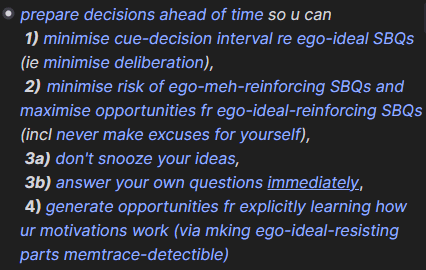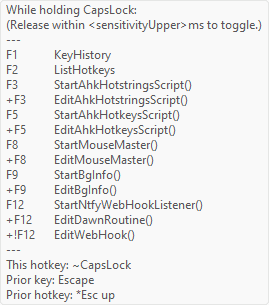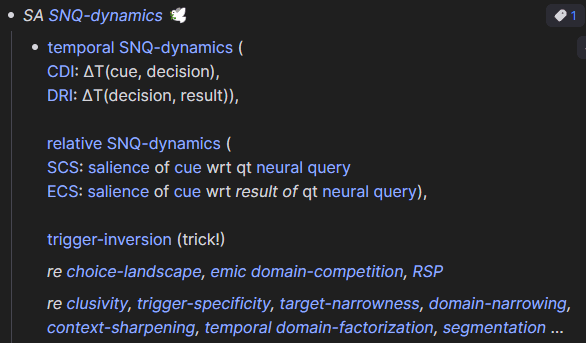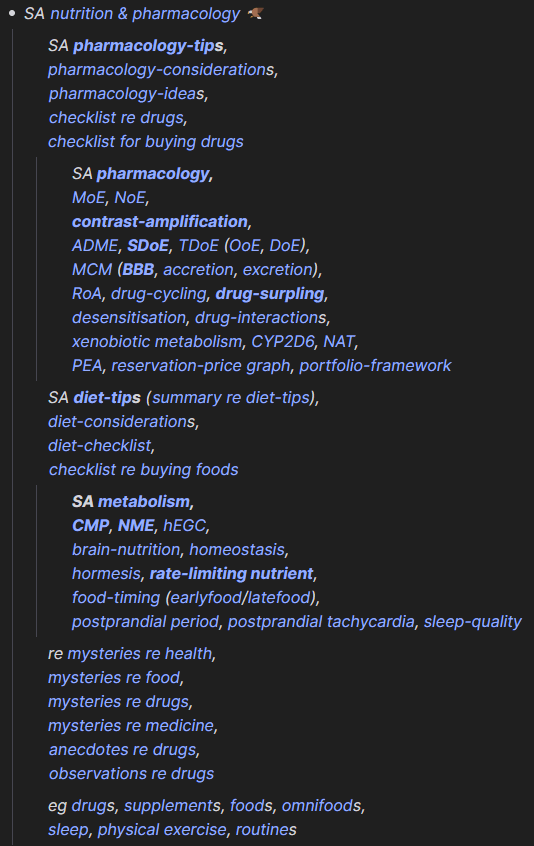1 Answers sorted by
10
personally, I try to "prepare decisions ahead of time". so if I end up in situation where I spend more than 10s actively prioritizing the next thing to do, smth went wrong upstream. (prev statement is exaggeration, but it's in the direction of what I aspire to lurn)
as an example, here's how I've summarized the above principle to myself in my notes:
(note: these titles is v likely cause misunderstanding if u don't already know what I mean by them; I try avoid optimizing my notes for others' viewing, so I'll never bother caveating to myself what I'll remember anyway)
I bascly want to batch process my high-level prioritization, bc I notice that I'm v bad at bird-level perspective when I'm deep in the weeds of some particular project/idea. when I'm doing smth w many potential rabbit-holes (eg programming/design), I set a timer (~35m, but varies) for forcing myself to step back and reflect on what I'm doing (atm, I do this less than once a week; but I do an alternative which takes longer to explain).
I'm prob wasting 95% of my time on unnecessary rabbit-holes that cud be obviated if only I'd spent more Manual Effort ahead of time. there's ~always a shorter path to my target, and it's easier to spot from a higher vantage-point/perspective.
as for figuring out what and how to distill…
Context-Logistics Framework
- one of my project-aspirations is to make a "context-logistics framework" for ensuring that the right tidbits of information (eg excerpts fm my knowledge-network) pop up precisely in the context where I'm most likely to find use for it.
- this can be based on eg window titles
- eg auto-load my checklist for buying drugs when I visit iherb.com, and display it on my side-monitor
- or it can be a script which runs on every detected context-switch
- eg ask GPT-vision to summarize what it looks like I'm trying to achieve based on screenshot-context, and then ask it to fetch relevant entries from my notes, or provide a list of nonobvious concrete tips ppl in my situation tend to be unaware of
- prob not worth the effort if using GPT-4 tho, way too verbose and unable to say "I've got nothing"
- eg ask GPT-vision to summarize what it looks like I'm trying to achieve based on screenshot-context, and then ask it to fetch relevant entries from my notes, or provide a list of nonobvious concrete tips ppl in my situation tend to be unaware of
- a concrete use-case for smth-like-this is to display all available keyboard-shortcuts filtered by current context, which updates based on every key I'm holding (or key-history, if including chords).
- I've looked for but not found any adequate app (or vscode extension) for this.
- in my proof-of-concept AHK script, this infobox appears bottom-right of my monitor when I hold CapsLock for longer than 350ms:
- this can be based on eg window titles
- my motivation for wanting smth-like-this is j observing that looking things up (even w a highly-distilled network of notes) and writing things in takes way too long, so I end up j using my brain instead (this is good exercise, but I want to free up mental capacity & motivation for other things).
Prophylactic Scope-Abstraction
- the ~most important Manual Cognitive Algorithm (MCA) I use is:
- Prophylactic Scope-Abstraction:
WHEN I see an interesting pattern/function,
THEN:- try to imagine several specific contexts in which recalling the pattern could be usefwl
- spot similarities and understand the minimal shared essence that unites the contexts
- eg sorta like a minimal Markov blanket over the variables in context-space which are necessary for defining the contexts? or their list of shared dependencies? the overlap of their preimages?
- express that minimal shared essence in abstract/generalized terms
- then use that (and variations thereof) as u's note title, or spaced repetition, or j say it out loud a few times
- this happens to be exactly the process I used to generate the term "prophylactic scope-abstraction" in the first place.
- other examples of abstracted scopes for interesting patterns:
- Giffen paradox
- > "I want to think of this concept whenever I'm trying to balance a portfolio of resources/expenditures, over which I have varying diminishing marginal returns; especially if they have threshold-effects."
- this enabled me to think in terms of "portfolio-management" more generally, and spot Giffen-effects in my own motivations/life, eg:
"when the energetic cost of leisure goes up, I end up doing more of it"- patterns are always simpler than they appear.
- Berkson's paradox
- > "I want to think of this concept whenever I see a multidimensional distribution/list sorted according to an aggregate dimension (eg avg, sum, prod) or when I see an aggregate sorting-mechanism over the same domain."
- Giffen paradox
- it's important bc the brain doesn't automatically do this unless trained. and the only way interesting patterns can be usefwl, is if they are used; and while trying to mk novel epistemic contributions, that implies u need hook patterns into contexts they haven't been used in bfr. I didn't anticipate that this was gonna be my ~most important MCA when I initially started adopting it, but one year into it, I've seen it work too many times to ignore.
- notice that the cost of this technique is upfront effort (hence "prophylactic"), which explains why the brain doesn't do it automatically.
- Prophylactic Scope-Abstraction:
examples of distilled notes
- some examples of how I write distilled notes to myself:
- (note: I'm not expecting any of this to be understood, I j think it's more effective communication to just show the practical manifestations of my way-of-doing-things, instead of words-words-words-ing.)
- I also write statements I think are currently wrong into my net, eg bc that's the most efficient way of storing the current state of my confusion. in this note, I've yet to find the precise way to synthesize the ideas, but I know a way must exist:






In doing research, I have a bunch of activities that I engage in, including but not limited to:
My models about when to use what process are mostly based on intuition right now.
I expect that if I had more explicit models this would allow me to more easily notice when I am using the wrong kind of process for whatever I am trying to achieve at that moment.
One of the core problems here seems to be, to get good at noticing when it would be good to distill something. You don't want to trash your documents by having lots of confused thoughts in them, while also capturing all the important insights that you had.
Have you encountered this problem, and if so how do you handle it?